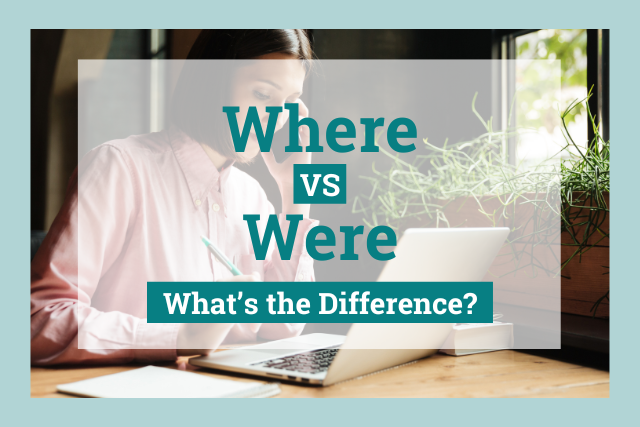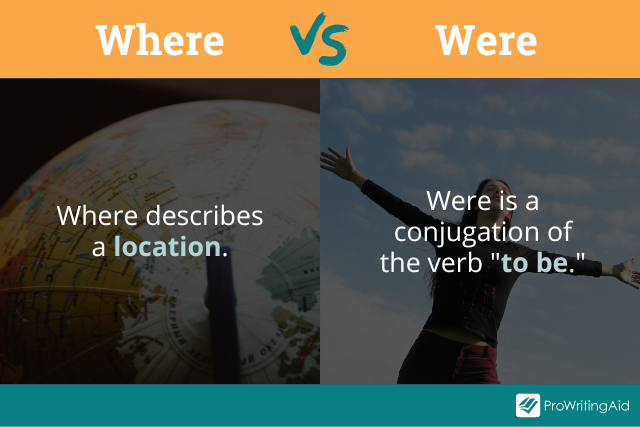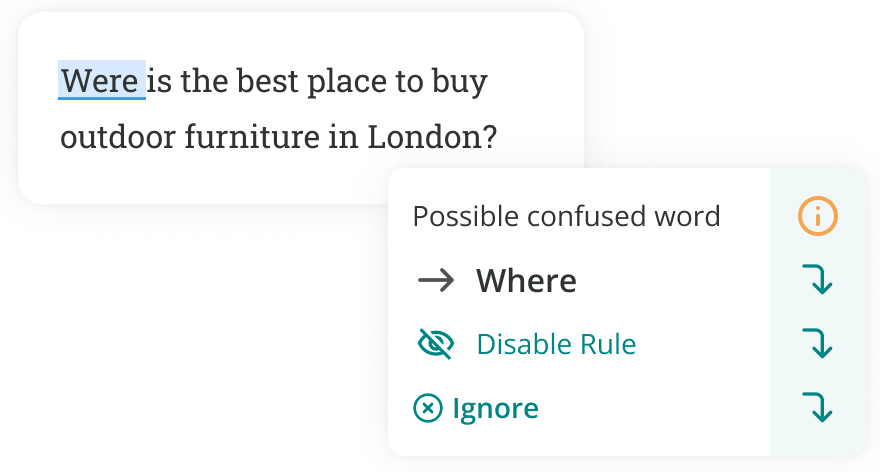
THE USAGE OF ‘WAS’ AND ‘WERE’ WITH EXAMPLES
Let’s start from the beginning.
These are the past simple forms of the verb ‘to be’. Generally, ‘was’ is used with singular pronouns (one subject), and ‘were’ is used with plural pronouns (more than one subject), but the pronoun ‘you’ is an exception!
WAS is usually used with the pronouns ‘I’, ‘she’, ‘he’, and ‘it’.
WERE is usually used with pronouns ‘you’, ‘we’, and ‘they’.
(See the information just before and after ‘USE 2’ below, for more information about the use of the pronouns ‘you’ and ‘I’.)
[Tweet “WAS is usually used with the pronouns ‘I’, ‘she’, ‘he’, and ‘it’. “]
USE 1:
PAST SIMPLE
Some basic sentence examples:
- I was married for 5 years.
- She was unwell last week.
- It was not my fault!
- We were worried about the test results.
- They were busy working all day yesterday.
- You were supposed to help me.
However, there are exceptions to this rule!
Firstly, as I mentioned before, even though ‘you’ is a singular pronoun it is used with WERE.
- You were asleep when he rang.
- Where were you yesterday?
- Whom were you talking to?
[Tweet “WERE is usually used with pronouns ‘you’, ‘we’, and ‘they’.”]
USE 2:
PAST SUBJUNCTIVE AS A CONDITIONAL
Secondly, the pronoun ‘I’ can be used with WERE as a conditional as well as with WAS. WERE is the past subjunctive of the present verb ‘to be’, meaning it expresses hope, possibility or supposition rather than stating a fact.
- If I were you, I wouldn’t touch that.
(I’m not you, it’s hypothetical – used for the present or future)
- If I were a multi-billionaire, I would rid the world of poverty.
(I’m not a multi-billionaire, it’s hypothetical – used for the present or future)
- If I were in his shoes, I would accept their offer.
(I’m not him or in his position, it’s hypothetical – used for the present and future)
- If I was rude to you yesterday, I’m very sorry.
(The condition is unclear, but it is presumed to have been true in the past)
- If I was annoying you last night, I’m sorry. I was in a bad mood.
(The condition is unclear, but it is presumed to have been true in the past)
- If I was healthier, I probably would have been able to win the race.
(The condition is unclear, but it is presumed to have been a possibility of being true in the past)
Read more:
If I Was or If I Were?
PAST CONTINUOUS / PAST SIMPLE
Remember that in Past Simple, a specific time is used to show when an action began or finished. In Past Continuous (Progressive), a specific time only interrupts the action.
USE 3:
INTERRUPTED ACTION IN THE PAST
[subject 1 + WAS/WERE + verb+ing + WHEN + subject 2 + past simple verb]
Use Past Continuous to indicate when a longer action in the past was interrupted, usually by a shorter action that occurs (Past Simple).
Here are some examples:
- She was studying when he called.
- He was cooking when the phone rang.
- They were shopping when they heard an explosion.
- We were dancing when the power went out.
- I was listening to music when the doorbell rang.
Read more:
How to use IS, WAS, THAT, THE!
USE 4:
SPECIFIC TIME AS AN INTERRUPTION
Similar to USE 1 above, however you can use a specific time as an interruption.
- At 3am last night, I was studying.
- Last night at 8pm, we were watching a movie.
- Yesterday at this time, I was sitting in my office.
USE 5:
DESCRIBING PARALLEL ACTIONS
You can use the Past Continuous to describe two parallel actions in one sentence. It expresses the idea that they were happening at the same time.
- I was cooking while he was playing with the baby.
- While Eleanor was studying, Toby was cooking a meal for them.
- I wasn’t paying attention when he was talking to me, so I don’t remember everything he said.
Read more:
Subjunctive “I Wish I Were” [Infographic]
USE 6:
A SERIES OF PARALLEL ACTIONS
A series of parallel actions can be used to describe the atmosphere at a particular time in the past.
- When I walked into my house, my husband was watching TV, the baby was crying, my son was playing computer games, and the dog was barking in the garden!
- When I stepped into the office, my boss was shouting at someone on the phone, his secretary was running towards his office, my assistant was printing a document, and all the telephones were constantly ringing!
USE 7:
REACTION OF A SUBJECT
[Subject + WAS/WERE + adjective + at/by/with + noun]
Used to show the reaction of a subject towards a noun.
- I was amazed at how clean the house was!
- We were surprised by their eagerness to help us.
- She was very happy with her new car.
USE 8:
ADVERBS OF FREQUENCY
The Past Continuous is used with adverbs of frequency such as ‘always’ or ‘constantly’ to express that something happened often in the past. Note: This does not apply to all the adverbs of time.
[Subject + WAS/WERE + adverb of time + verb+ing]
- He was always buying me flowers.
- She was constantly talking throughout my lessons.
- They were always sitting next to each other in class.
- She was usually sitting in the garden on a Friday.
- I was continuously exceeding expectations.
Read more:
How To Use The Passive Voice With Helpful Examples
USE 9:
WHILE VS WHEN
Dependent clauses are groups of words which have meaning but aren’t complete sentences. Some clauses can start with the word ‘when’ and others can start with the word ‘while’ (Note: This does not apply to all dependent clauses). When you talk about things in the past, ‘when’ is usually followed by the Past Simple verb, whereas ‘while is followed by the Past Continuous verb. They have similar meanings but
When you talk about things in the past, ‘when’ is usually followed by the Past Simple verb, whereas ‘while is followed by the Past Continuous verb. They have similar meanings but emphasize different parts of a sentence.
Here are some examples:
- I was studying when the doorbell rang.
- While I was studying, the doorbell rang.
- She was cooking when her friends arrived.
- While she was cooking, her friends arrived.
USE 10:
ADVERBS OF TIME PLACEMENT
Adverbs of time can be added to sentences in the Past Continuous tense. You can use adverbs such as always, never, ever, only, still, just, etc. Here are some examples to show you the placement for adverbs:
- Weren’t you ever listening to what I said?
- You were never listening to anything I said.
- Was she always telling you off?
- She was always telling you off.
- He was still shouting as she walked away.
- Was he still shouting as she walked away?
USE 11:
ACTIVE AND PASSIVE
Sentences can be active or passive. Most sentences are active, where the subject is doing the action and the object is receiving the action. The subject and object can be swapped around to change a sentence from active to passive.
Active – The professor was teaching his students.
Passive – The students were being taught by the professor.
Active – Jenny was making tea for her friends.
Passive – Tea was being made by Jenny for her friends.
Active – Her brother was hugging her.
Passive – She was being hugged by her brother.
USE 12:
USING A SPECIFIC PERIOD OF TIME
You can describe the state of a noun at a particular time in the past.
[Subject + WAS/WERE + time period]
- I was only 16 when I started working full-time.
- Why were you being horrible to me last week?
- I was just a paperboy before I became CEO of the New York Times.
Read more:
When to Use THIS and THAT in English?
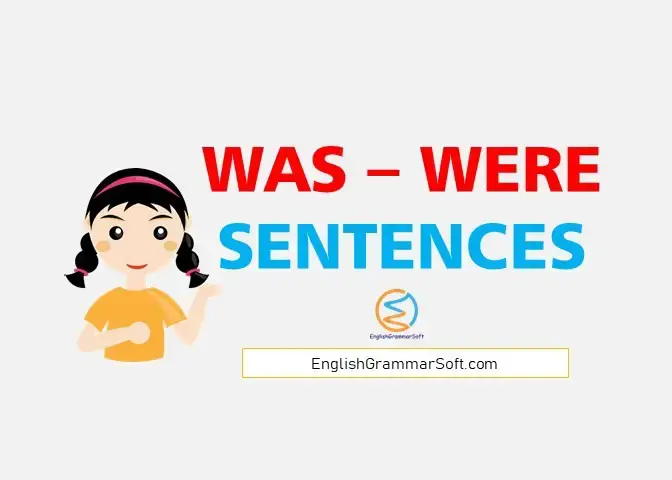 Pin
Pin
Was Were Sentences | 50 Examples
- I was disappointed that so few people attended the event.
- You were busy when I called this morning.
- You were helpful because you showed me the way to the airport.
- She was a good teacher because they enjoyed her lessons.
- They were surprised when they learned the truth.
- He was hungry, so he left for dinner early.
- She was going to work when she got in a car accident.
- It was tranquil outside when I woke up.
- All her ideas were well thought out.
- They were the best team members to have on my side.
- I was late for class because my shoelace broke.
- My dog was tired after a long day of play.
- The restaurant I had dinner at was expensive, but the food and waitstaff were great!
- Your application was excellent; however, it was decided to offer the position to a candidate with more experience.
- The last election was fair and square.
- Who was at the door?
- How much sugar was there in the pot?
- Helen was a beautiful girl with red hair.
- He was confident of his success.
- He was a very cunning man.
- You were not at fault.
- She was resting on her oars after her retirement.
- He was planting flowers in his lawn last Sunday.
- All the students were present except Bob.
- He enjoyed his life when he was young.
- He was working as HR Manager in this firm a year ago.
- The novel which I read last night was fascinating.
- Jon was my intimate friend.
- Her opinion was straightforward and honest, as always.
- Last month Tom was traveling to Spain.
- The book was not on the table.
- The children were playing hide and seek in the park yesterday.
- There was no light in the street.
- The beggar was not lame.
- Where were you living last year?
- All the tickets for the concert were sold.
- What were you looking for in my room last night?
- He was weighed down with financial burdens.
- She was at her wit’s end on how to act.
- Jon was Mr. Bob’s blue-eyed boy.
- Who was in the garden last night?
- Was this lesson very difficult?
- Why were you sad yesterday?
- The speaker was cutting a sorry figure because of his wrong pronunciation.
- All the pages of the book were dog-eared.
- Last year he was studying Electrical Engineering.
- We were hardworking students.
- The mechanic was repairing my car an hour ago.
- I was very excited about my new job.
- The wedding was supposed to be simple.
Read also: Is – am – are Sentences (50 Examples)
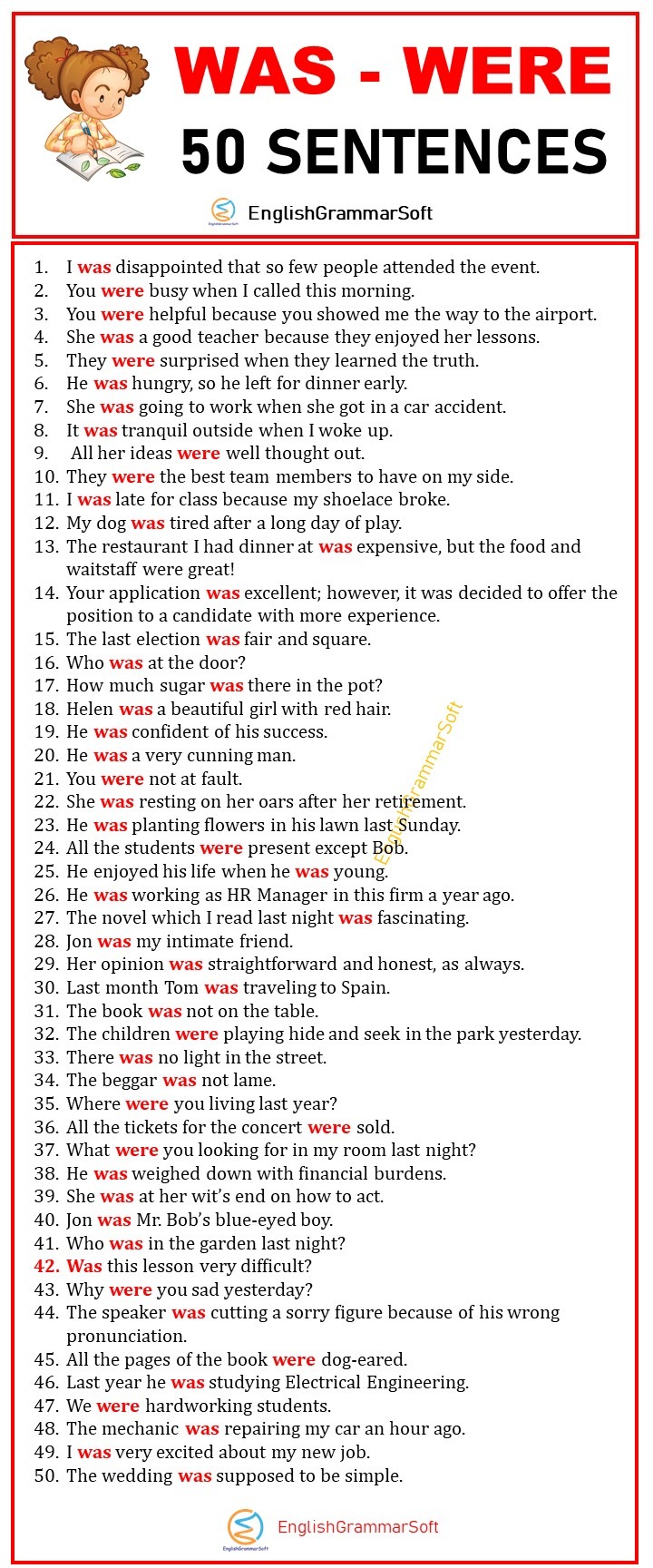
Fact-checked by
Paul Mazzola
Differences between where and were
The differences between where and were are the pronunciation, spelling, and meaning. One is always a verb; one is an adverb and part-time subordinating conjunction. They are two different words and have different meanings.
Where definition
Where can be an adverb or, informally, a subordinating conjunction linking dependent and independent clauses.
As an adverb that usually appears after a place or situation. It means in, at, or to which, as with a sentence like “I lived in New York City, where I worked for several years.”
Where in a sentence
Here are sentences using the word «where» to show in, at, or to which:
-
“She studied in London, where she became a master art restorer.”
-
“To which address is the envelope going? Where are you sending it?”
-
“I live at the intersection of Smith and Vine Streets. I live where the two roads cross.”
Where can also be used as a subordinating conjunction as with:
Here the meaning of where is “in which.”
Where as a conjunction can also mean “in the place that,” or “in situations that,” as with these sentences:
-
“Where the rubber meets the road, we separate the adults from the children.”
-
“Where the desert offers no visible water, animals inventively dig.”
-
“We hid our treasure where no other pirates could find it.”
Where is pronounced to rhyme with bear, hair, or there.
Were definition
Were is a verb form of to be, and it is three different verb forms:
-
second-person singular past tense – “You were in line first.”
-
plural past tense – “They were miners.”
-
past subjunctive tense – “If I were in his shoes, I would have done the same thing.”
Were is pronounced to rhyme with burr and stir.
Let’s review the word «were» in its three different verb forms and learn how to use «were» in sentence.
Were in a sentence
The second-person singular past tense refers to using were for the singular second-person pronoun you, or when referring to another person (only one) by name. Here are sample conversation using the past tense of the verb were:
You: “Bettine, were you in the post office yesterday?”
Bettine: “Yes. I was mailing a box of llama chow. Why, were you there too?”
You: “You were in line ahead of me. Were you aware I was there or was I where you could not see me?”
Bettine: “I was not aware. Were you where the line turned around the pillar?”
The plural past tense of to be is were. This plural form is used for all plural noun forms, such as we and they.
You: “Together, we were in the post office an hour.”
Bettine: “My coworkers were wondering where I was.”
You: “The postal workers were sorting and canceling as fast as they could.”
Bettine: “They really were, but I was still late getting back, where my boss was upset.
The past subjunctive tense is reserved for any hypothetical or unreal event in the past, present, or future. If it is unlikely to happen or cannot happen at all, use the past subjunctive tense:
Bettine: “Were I to suddenly sprout wings, I would not be able to get back to the office in time.”
You: “It was as if time were moving backward, standing in that line.”
Bettine: “If I were a less patient person, I would throw a loud tantrum.”
You: “Suppose we were to bring sandwiches and have a picnic in the line next time!”
Bettine: “It would be as if we were completely free for the afternoon.”
When to use where or were
Now that we see that where is an adverb or sometimes a subordinating conjunction, and were is always a verb, we should have no trouble sorting out when to use which word.
We always use were when we need a verb or a helping verb:
-
We were happy children.
-
They were playing in the snow.
-
You were experimenting with buoyancy.
-
You and I were floating pennies on saltwater.
-
Were I able to turn back time, I would go back to my eighth birthday.
-
If I were you, I would review my notes for that test.
We use where to mean location, as with at, in, or to which:
-
Where would you like the llama sent?
-
Where did you put the llama’s leash?
-
The llama goes into the paddock, where she eats alfalfa.
-
The actor moved to Los Angeles, where he starred in a llama drama.
-
Antarctica is a land where llamas are ill-suited for travel.
We also use where as a conjunction:
-
This is the time in the movie where the hero rides a llama.
-
Where I go, no llama should follow.
-
Where the hard rains fall, there you will find llamas.
Where vs. were examples
See how well you can separate where and were by completing these example sentences.
Put where or were in the correct blanks in these sentences:
-
“There, _______ the river bends to the north, is the best place to cross with the llamas.”
-
“_______ I a honey badger, I could live a life of ease.”
-
“_______ I see hard work and long days ahead, you see the carefree life of a llama farmer.”
-
“When _______ you going to tell us about the llama farm?”
-
“It was as though she _______ going to jump over that fence and escape.”
If we were you, we would try before we looked at the answers.
-
“There, where the river bends to the north, is the best place to cross with the llamas.”
-
“Were I a honey badger, I could live a life of ease.”
-
“Where I see hard work and long days ahead, you see the carefree life of a llama farmer.”
-
“When were you going to tell us about the llama farm?”
-
“It was as though she were going to jump over that fence and escape.”
Were vs. we’re
The word we’re is another English word that gets confused with were. It is pronounced the same way and looks like the word were with an apostrophe.
We’re is the conjunction of the pronoun we and the plural present tense form of the verb to be, are.
There are plenty of questions associated with the verb to be. “To be or not to be,” for one. On a less existential note, there’s the question of how to use to be in the grammatically correct way. I am, you are, he was, they were—the forms of the verb to be, among many other things, are messy in English.
You might find yourself puzzling out a sentence such as: If she was unhappy, she should have said so. Is this sentence correct? Or should If she was switch to the phrase If she were?
Was vs. were, what’s the difference?
Much of the confusion lies in when to use was versus were, which are the past tense forms of to be. The answer all depends on two factors: 1) is your verb using first, second, or third person? And, 2) is your verb in past indicative or past subjunctive tense? Past indicative is used for ordinary objective statements or questions, and past subjunctive is used for imaginary or hypothetical statements or questions.
Were is always correct in the past subjunctive:
- I were
- You were
- He/she/it were
- We were
- You were
- They were
If this looks a little odd, remember that these constructions are often accompanied by a word like if, as if, and though. You might say, “If I were a rich man …”
Don’t we all wish we were rich … so would you say “wish I was” or “wish I were”?
To conjugate to be in the past indicative, however, using was or were depends on the subject:
- I was
- You were
- He/she/it was
- We were
- You were
- They were
It’s possible to get mixed up even with this straight conjugation in mind. But there are some tips and tricks to remember to make sure you use the correct verb form every time.
When to use was
Was is a past tense indicative form of be, meaning “to exist or live,” and is used in the first person singular (I) and the third person singular (he/she/it).
You use the past indicative when you’re talking about reality and known facts. If you went to the store, for example, then you would say, “I was at the store” because it is something that definitely happened. The same is true if you’re talking about someone else in the third person (or if you make the choice to talk about yourself in the third person). You would say, “Sarah was at the store,” for example, or “She was at the store.”
Another way to use was is as an auxiliary verb with a singular subject in the past continuous tense. An auxiliary verb is used with another verb that follows it in the sentence to express different tenses, aspects, moods, etc., and the past continuous tense refers to something that was ongoing in the past.
If you were to modify the previous example (I was at the store) with an auxiliary verb, you would say, “I was searching for spices at the store.” Was is the auxiliary verb (or helping verb) used to talk about what you were doing in the past (searching).
Examples of was in a sentence
So to recap, if you’re talking about something real that happened in the past, use the past tense indicative: I was or he/she/it was. (Were is used with the other pronouns.) Here are some example sentences:
- I was sick last night.
- He had an amazing imagination when he was a child.
- We turned down the music because it was too loud.
When to use were
Whereas was is the singular past tense of to be, were is used for both the third person plural past tense (they and we) and the second person past tense (you).
In the past indicative, were acts similar to was. “They were at the store,” you could say, for example. It also acts similar as an auxiliary verb, as in “They were searching for spices at the store.”
Things get a little more complicated with were, though, and it’s all thanks to this thing called the subjunctive mood.
The subjunctive mood is the opposite of indicative, and it’s all about things that are unreal or conditional. When you’re talking about your hopes and dreams, you’re using the subjunctive mood. The same goes for talking about something you intend or want to do, as well as for things you know will never be true or are no longer true.
A telltale sign that you’re working with the subjunctive mood is the word if, because this suggests a hypothetical. “If I were to go shopping, I could search for spices,” for example. It doesn’t matter if the subject is singular or plural, or if it’s first, second, or third person. If you’re using the subjunctive mood, the grammatically correct past tense of to be is were.
Speech is always evolving, and the subjunctive mood is used far less extensively than it was in the past. And what’s more, much of the way we talk and write in everyday English isn’t what our old schoolteachers would wag the ruler at us as “grammatically correct.” But if you want to conform with those standards, use were when it comes to the past tense of to be.
Examples of were in a sentence
If you’re discussing things that are unreal or conditional, then use were: I were and he/she/it were. Here are some example sentences:
- If I were in better shape, I would run in the race.
- She took over the meeting as if she were the boss.
- His father talked to him as though he were a child.
When to use was vs. were
To sum it all up, always use was for the past indicative first and third person singular. That goes for whether it’s a simple verb or auxiliary. “I was ready to watch the Auburn Tigers win the game,” and “He was watching number two score the winning touchdown.”
Write smarter with our thesaurus-powered Grammar Coach™! Get spelling help, synonyms suggestions, grammar check and more! Sign up now!
For the past indicative second person and all plural forms, use were. “They were in the stadium,” and “You were standing the whole game.” Also use were for the hypothetical or fantastical subjunctive mood for both singular and plural forms, as in “If they were to bring back popcorn, I would eat it.”
There was vs. there were
Was and were are also used in some instances with the pronoun there. This pronoun introduces a sentence or clause in which the verb comes before its subject (or those instances where the verb has no complement). When the subject that follows is singular, use was: When I opened the fridge, I found there was no more milk left. When the subject that follows is plural, use were: When I opened the fridge, I found there were no more eggs left.
In the end, yes, you were technically correct when you noted that the class lyric “I wish I was a little bit taller” should have been “I wish I were a little bit taller.” But don’t fret if you get it technically wrong at times. Were may be formally correct, but because the subjunctive mood has largely fallen out of common use, was may slip into yours and others’ speech at times.
Were and where are two words that are easily confused, even by native English speakers. They look similar, but they are spelled and pronounced differently, and they have very different meanings.
So, when should you use each word?
The short answer is that were is a past tense form of be, while where means “in a specific place.”
Read on to learn more about where vs were and how to use these words correctly in your writing.
What’s the Difference Between Where vs Were?
The most obvious difference between where and were is that where describes a location, while were is a conjugation of the infinitive verb to be.
Let’s look at the definition and meaning of each word in more detail.
Were Definition and Meaning
Were is one of the past tense forms of the verb to be.
We use were as the simple past tense form when writing in the second person singular: “You were snoring so loudly last night!”
We also use were as the past form of to be when writing in third person plural or first person plural: “They were happy to see you at the party yesterday,” or “We were thrilled to receive your letter last week.”
Finally, in addition to the simple past tense, we also use were to indicate the past subjunctive tense, which we use to express something hypothetical or imagined.
For example, you might write: “If I were an animal, I think I’d be a giraffe,” or “She greeted them as if they were old friends.”
Where Definition and Meaning
Where is a word that refers to a specific, unknown place.
When it is used in a question to ask about a place or location, it’s a question word that’s used as an adverb or pronoun. For example, you might ask, “Where is my pen?”
As a conjunction, where means in or at a specific place or time. For example, you might say, “The pen is right where you left it.”
Sometimes, we also use where to talk about a metaphorical place, rather than a literal one.
For example, you might say, “He annoyed me to the point where I left the room.” In this case, where doesn’t refer to a literal location, just a point in a process.
Where vs Were Examples in Sentences
The best way to learn spelling and grammar is through examples! Here are a few example sentences of each word from English literature.
Examples of Were in a Sentence
“Libraries were full of ideas—perhaps the most dangerous and powerful of all weapons.”—Sarah J. Maas, Throne of Glass
“All grown-ups were once children… but only few of them remember it.”—Antoine de Saint-Exupéry, The Little Prince
“If all else perished, and he remained, I should still continue to be; and if all else remained, and he were annihilated, the universe would turn to a mighty stranger.”—Emily Brontë, Wuthering Heights
“So I walked back to my room and collapsed on the bottom bunk, thinking that if people were rain, I was drizzle and she was a hurricane.”—John Green, Looking for Alaska
“The Karands were a warlike race with little patience for cultural niceties.”—David Eddings, Demon Lord of Karanda
“I hate to hear you talk about all women as if they were fine ladies instead of rational creatures. None of us want to be in calm waters all our lives.”—Jane Austen, Persuasion
“We were five. You had on a red plaid dress and your hair… it was in two braids instead of one. My father pointed you out when we were waiting to line up.”—Suzanne Collins, The Hunger Games
Examples of Where in a Sentence
“I may not have gone where I intended to go, but I think I have ended up where I needed to be.”—Douglas Adams, The Long Dark Tea-Time of the Soul
“It isn’t what you have or who you are or where you are or what you are doing that makes you happy or unhappy. It is what you think about it.”—Dale Carnegie, How to Win Friends and Influence People
“Be with me always—take any form—drive me mad! only do not leave me in this abyss, where I cannot find you! Oh, God! it is unutterable! I can not live without my life! I can not live without my soul!”—Emily Brontë, Wuthering Heights
“But mostly, as much as I hate it, I can sense where the Thrall are.”—C.T. Adams and Cathy Clamp, Touch of Darkness
“Books say: She did this because. Life says: She did this. Books are where things are explained to you; life is where things aren’t. I’m not surprised some people prefer books.”—Julian Barnes, Flaubert’s Parrot
“The result was sloping tiled floors where an errant step up would meet three steps down.”—Christine Barber, The Replacement Child
“It’s a dangerous business, Frodo, going out your door. You step onto the road, and if you don’t keep your feet, there’s no knowing where you might be swept off to.”—J.R.R. Tolkien, The Lord of the Rings
How to Remember When to Use and Spell Where vs Were Correctly
There are several different tricks you can use for remembering how to spell where vs were correctly.
Because where and were sound different when spoken, one way to remember the difference is to focus on the pronunciation.
Where rhymes with there. Were rhymes with fur. It’s a good idea to read your sentence out loud to see if you are using the correct word.
Another useful mnemonic for remembering the difference is to notice that where has an h for home, and home is a place. Therefore, if you’re writing about a place, you should use where with an h.
Finally, if you’re not sure you’re using the right word, you can always run your writing through ProWritingAid, which will catch tricky misspellings like “were are you” or “you where over there”!
Take your writing to the next level:
20 Editing Tips from Professional Writers
Whether you are writing a novel, essay, article, or email, good writing is an essential part of communicating your ideas.
This guide contains the 20 most important writing tips and techniques from a wide range of professional writers.









